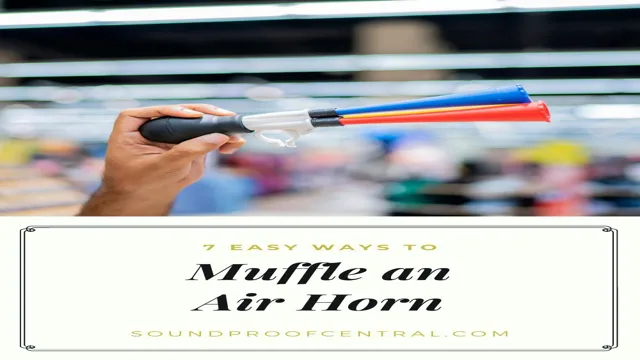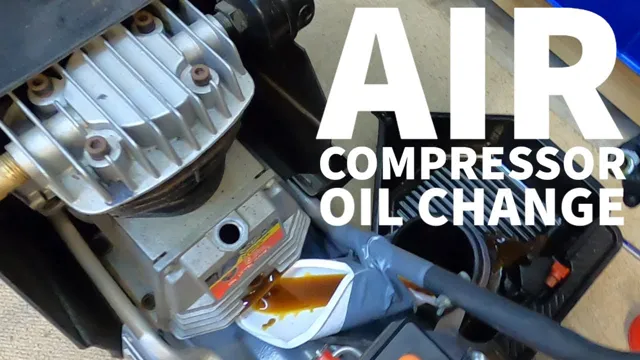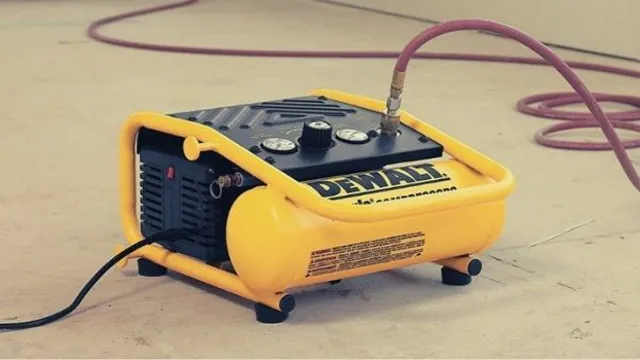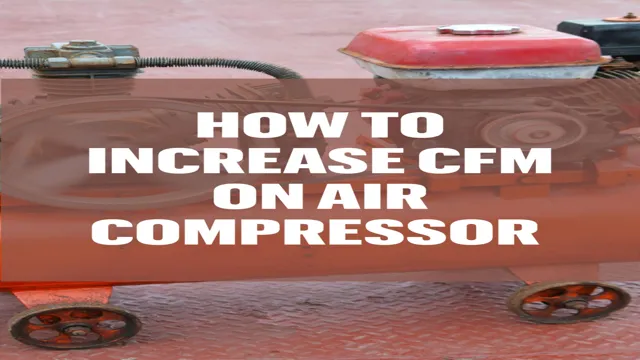
Do you find the noise from your air compressor to be bothersome or even unbearable? We know how you feel! The loud humming, buzzing, and screeching sounds that come from this machine can be overwhelming and disruptive to your peace. But worry not because there are ways to muffle air compressor noise and enjoy a quieter operation. In this blog post, we’ll explore several effective solutions that you can apply to reduce air compressor noise.
Whether you use an air compressor for work or hobbies, you’ll appreciate the tips we’ll share to make the experience more enjoyable. Get ready to say goodbye to intrusive compressor noise and hello to a more peaceful environment!
Understanding the Noise
Are you tired of the loud and annoying noise your air compressor makes? Well, you’re not alone. Many people struggle with the sound that an air compressor generates, especially if it’s used for extended periods. Fortunately, there are several ways to reduce the noise and make your working environment more peaceful.
One solution is to invest in a sound-dampening enclosure specifically made for air compressors. These enclosures can help reduce noise by up to 50 percent. Another option is to place your air compressor on top of a rubber mat or other vibration-absorbing material.
This will help reduce the vibration that generates noise. However, keep in mind that muffling air compressor noise can be a complex task, depending on the environment, compressor type, and noise level you’re dealing with. Be sure to do proper research to choose a solution that best fits your needs and budget.
By implementing some of these suggestions, you will be able to reduce noise levels and work more comfortably, even with an air compressor in your space.
Decibels and Hearing Damage
Noise-induced hearing loss is a growing concern, especially among young adults who are often exposed to loud music. This is where decibels come into play. Decibels measure the loudness of sounds, and an increase of just 10 decibels represents a doubling of the sound intensity.
Exposure to sounds above 85 decibels for extended periods can cause irreversible damage to hearing. To put this into perspective, a rock concert can be over 100 decibels, causing potential hearing loss after just 15 minutes of exposure. It’s essential to understand the noise levels around you and take necessary precautions to protect your hearing, like wearing earplugs.
Don’t take your hearing for granted, as it’s a precious gift that you should strive to protect!

Sources of Air Compressor Noise
Air compressor noise can be quite a disturbance, especially in settings where noise levels need to be kept to a minimum. Understanding the sources of air compressor noise is vital in finding ways to reduce it. One of the leading causes of air compressor noise is the vibration caused by the motor and compressor working together.
This vibration can be amplified if the compressor is not fixed securely on a sturdy base. Another cause of air compressor noise is the cooling fan. Cooling fans that are dirty or worn can make loud noises, and replacing them may be necessary.
Additionally, the air intake and exhaust mufflers can become clogged or damaged, resulting in a loud noise during operation. It is also important to note that air compressors will typically produce a certain level of noise, so selecting a model with a low decibel rating can help to reduce noise levels. By understanding the different sources of air compressor noise, it is easier to identify the problematic areas and implement noise reduction solutions.
Methods of Muffling Noise
If you’re looking to reduce noise from your air compressor, there are a few methods you can try. One option is to use soundproofing materials, such as acoustic foam or blankets. These materials can be wrapped around the compressor or laid on the floor underneath it to absorb sound waves.
Another option is to build an enclosure around the compressor, which can be made from wood or other sound-absorbing materials. This helps to contain the noise and prevent it from spreading to other areas. You can also try installing vibration pads or mats underneath the compressor to reduce the amount of noise and vibrations that are transmitted through the floor.
Finally, if all else fails, you may want to consider purchasing a quieter air compressor model that is designed to produce less noise in the first place. By using one or more of these methods, you should be able to significantly reduce the amount of noise produced by your air compressor.
Soundproof Enclosure
If you’re looking to create a soundproof enclosure for your home studio, office or workshop, there are several methods you can use to effectively muffle noise. One of the most common methods is the use of insulation materials such as fiberglass or mineral wool. These materials absorb sound waves and prevent them from bouncing around the room.
Another method is to use sound barriers such as mass loaded vinyl, which can be applied to walls or ceilings to block out unwanted noise. You can also try using acoustic foam panels to absorb sound waves and reduce echo in your space. Additionally, sealing gaps and cracks in the walls and windows can significantly reduce noise transmission.
By using a combination of these methods, you can create a soundproof enclosure that effectively muffles noise and allows you to work or relax in peace.
Rubber Pads and Mats
Rubber pads and mats can be effective methods of muffling noise in various settings. These products are versatile and can be used in different areas, such as residential, commercial, and industrial, to reduce noise pollution and create a more peaceful environment. Rubber is an excellent material for soundproofing as it has sound absorption properties that help deaden sound waves and prevent them from bouncing off surfaces, causing echoes and resonance.
Additionally, rubber pads and mats can be installed under appliances, furniture, machinery, or other items prone to create noise, reducing vibration and thus minimizing sound transmission. Investing in rubber products, such as acoustic rubber mats, rubber pads, and rubber sheets, can significantly reduce unwanted noise and offer better sound quality. Plus, these products are durable, slip-resistant, and easy to install, making them ideal for high-traffic areas.
By adding rubber soundproofing products to your residential, commercial, or industrial space, you can create a more peaceful, comfortable, and enjoyable environment.
Acoustic Insulation
Acoustic Insulation If you’re looking to reduce the amount of noise pollution entering your home or office, acoustic insulation is the key. There are different methods of muffling noise that can be used, depending on your specific requirements. One of the most popular ways to reduce noise transmission is through the use of a sound-absorbing material such as fiberglass insulation.
This material can be placed in walls, ceilings, and floors to effectively absorb sound waves and prevent them from passing through. Another method commonly used is a sound barrier, which involves installing sound-resistant materials like drywall, mass loaded vinyl, or resilient channels. These materials are designed to block sound transmission and prevent it from entering the building.
Other methods include acoustic panels, soundproof curtains, and sealants that caulk gaps to ensure noise won’t leak in. To achieve maximum results, combining different techniques is often necessary. So, if you want to create a peaceful and quiet environment, acoustic insulation is definitely worth exploring.
Tips for Effective Noise Reduction
Air compressors can be a vital tool in many industries. However, the loud noise they produce can be quite a disturbance. Luckily, there are ways to muffle air compressor noise.
One effective tip is to install soundproofing materials in the room where the compressor is located. For instance, you can use acoustic foam panels or place sound-deadening curtains on the walls. Another way is to build an enclosure around the compressor.
You can make it from wood or use special soundproofing materials such as mass loaded vinyl. The enclosure should have ventilation holes to avoid overheating, but the holes should be small enough not to let the noise out. Lastly, you can use silencers or mufflers, which are attachments that reduce the noise coming out of the compressor.
With these tips, you can minimize the noise level, creating a more comfortable environment for yourself and those around you.
Placement and Grounding
If you’re dealing with unwanted noise in your audio recordings, one important thing to consider is the placement and grounding of your equipment. Poor placement of microphones, monitors, and other devices can lead to interference, feedback, and other noise issues. Make sure your microphones are positioned correctly, away from sources of noise such as air conditioners or electrical equipment, and properly grounded to reduce the risk of unwanted interference.
Additionally, pay attention to the placement of your monitors and speakers to avoid creating feedback loops. By taking these steps to carefully place and ground your equipment, you can drastically reduce the amount of unwanted noise in your recordings and create a cleaner, more professional finished product.
Maintenance and Upkeep
Maintaining and keeping your equipment in good condition is essential to reduce noise levels! Regularly inspecting and replacing worn-out parts, tightening loose connections, and lubricating moving parts can help reduce vibrations and the resulting noise. Additionally, a well-maintained machine is more likely to function efficiently, which results in less noise output. Ensuring proper ventilation and a clean working environment by dusting your machine frequently eliminates unnecessary noise created by overheating or restricted airflow.
Making these small changes can make a significant difference in the noise level of your equipment, and by extension, your workplace.
Final Thoughts
In conclusion, if you want to muffle air compressor noise, there are a few effective ways to do so. From using acoustic foam panels, building an enclosure, to installing a muffler, these methods can significantly reduce noise levels. Remember to also consider the location of the compressor and the size of the space it’s in.
If the compressor is in a confined area, then sound waves can bounce off the walls and create even more noise. Don’t forget to wear the appropriate safety gear, including ear protection, when working with an air compressor as the noise can cause hearing damage over time. By taking these steps, you can enjoy a quieter workspace without compromising the performance of your compressor.
So why not give it a try and see the difference for yourself?
Conclusion
In conclusion, muffling air compressor noise may seem like a daunting task, but with the right techniques and tools, it can be easily achieved. From soundproofing your workspace to installing a noise reduction kit, there are various options available. However, the easiest and most effective way to muffle air compressor noise is to simply turn up the volume on your favorite tunes and let the music drown out the sound.
After all, who needs hearing when you have sweet, sweet jams?”
FAQs
What are some common reasons for air compressor noise?
Some common reasons for air compressor noise include vibration, loose or worn parts, and improper installation.
How can I reduce air compressor noise in my garage or workshop?
There are several ways to reduce air compressor noise, including purchasing a quieter model, using rubber or foam pads to isolate it from flooring or walls, and building an enclosure around the compressor.
Can adding insulation to the walls of my garage or workshop help reduce air compressor noise?
Yes, adding insulation can help absorb some of the sound and reduce the overall noise level in the room.
Are there any specific types of air compressors that are quieter than others?
Yes, there are some models of air compressors that are designed specifically for quieter operation, such as oil-free compressors or those with low RPM motors.
Can using a muffler or silencer attachment reduce air compressor noise?
Yes, these attachments can help reduce the noise level of an air compressor by muffling the sound as it exits the machine.
Is it safe to modify an air compressor to make it quieter?
It is generally not recommended to modify an air compressor in any way, as it can compromise the machine’s safety and functionality. It is better to invest in a quieter model or use noise-reducing techniques.
What should I do if my air compressor is still too loud even after trying noise-reducing methods?
If your air compressor is still too loud, it may be time to consider moving it farther away from living spaces or investing in a professional noise-reducing solution, such as a soundproofing barrier or acoustic curtains.







